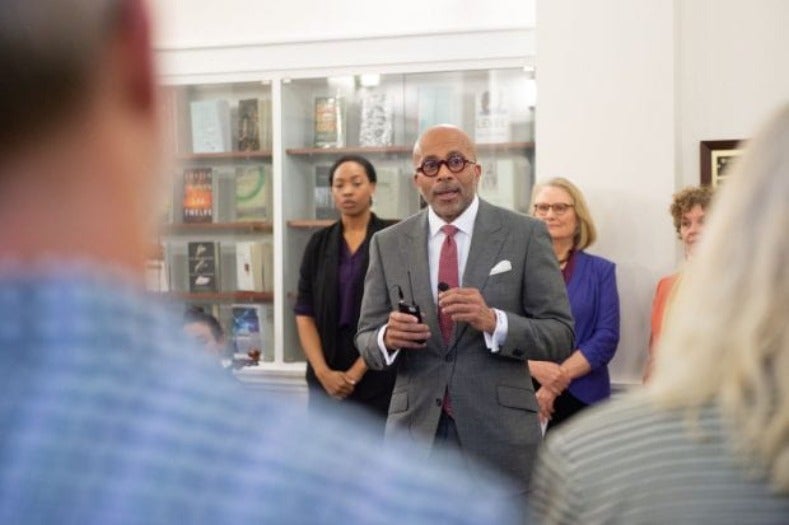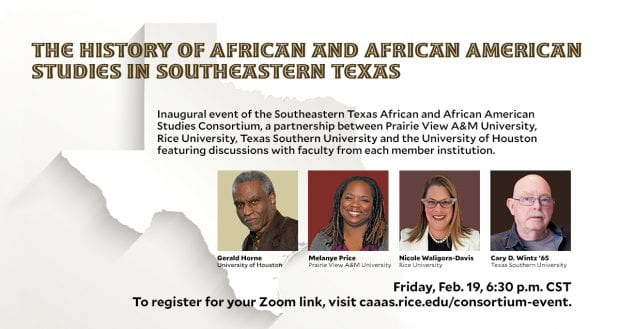Rice University and its Center for African and African American Studies (CAAAS) have partnered with the University of Houston, Texas Southern University and Prairie View A&M University to form a new collaboration committed to African and African American Studies scholarship: the Southeastern Texas African and African American Studies Consortium.
The alliance between the Houston-area institutions will take advantage of their geographic proximity — as well as Houston’s rich history — to pool intellectual resources and continue elevating the field of African and African American studies (AAAS). This collaborative effort, which is jointly housed between all four partner universities, comes at a time when the field is undergoing expansion and investment nationwide.
“It's untapped potential,” said CAAAS director Anthony Pinn, Rice’s Agnes Cullen Arnold Professor of Humanities, of the robust community of AAAS scholars in Houston. “It’s a unique development for us; we've not done anything like this before.”
The Southeastern Texas African and African American Studies Consortium will host its first event Feb. 19 at 6:30 p.m., a panel discussion on “The History of African and African American Studies in Southeastern Texas.” Panelists will include Nicole Waligora-Davis, associate professor of English at Rice, and historian Gerald Horne from the University of Houston.
Pinn said he hopes the consortium will continue to open space for even more conversations across campuses in ways that haven’t previously taken place.
Rice launched its Center for African and African American Studies in 2019, expanding on the previous African Studies minor, developing an introductory course and creating a new graduate certificate program within its first year. The new minor remains a collaborative track between the schools of Humanities and Social Sciences.
The University of Houston (UH) is home to the oldest AAAS program in Texas. Established in 1969, its interdisciplinary African American Studies Program has hosted such important events as the National Council for Black Studies conference (most recently in 2017). The UH program was overseen by director James Conyers, the University Professor of African American Studies, from 2002 until his death on Jan. 25.
Before he died, Conyers, who was one of the founding members of the consortium, said he was excited for the four universities to share research, pedagogy and institutional developments.
“Being around smart people who are doing good work … that’s always a perk,” said Conyers, who will be honored at the Feb. 19 panel discussion.
Prairie View A&M recently established the Ruth J. Simmons Center for Race and Justice and an African American Studies Initiative, each backed by $1 million in grants. Melanye Price, the Endowed Professor of Political Science, serves as both the principal investigator for the African American Studies Initiative backed by the Mellon Foundation and the inaugural director of the Simmons Center, which launches Feb. 10.
“I'm so excited about this partnership because we have all these colleges right here in Houston doing interesting work related to race, and it allows us to come together and amplify the work we're all doing so we're not working in silos anymore,” Price said. “And I think what that will allow us to do is to bring really interesting programs, conferences, lectures and all of those things to our community — both our campus communities and the Greater Houston community.”
Pairing predominantly white institutions (PWI) with historically Black universities is another benefit offered by the consortium, she said.
“I think it's particularly important on PWI campuses because it’s going to strengthen their students’ experience around multicultural and racial issues,” Price said. “And for us it's good to give our students exposure to students on other campuses, so I'm excited about what it means for us and the kinds of things we can do going forward.”
Cary Wintz ‘65, Distinguished Professor of History at Texas Southern University (TSU) and director of its master’s program in history, has taught African American history at TSU since 1971. He just returned from spending a year at the Air Force Academy, where he served as a distinguished visiting professor of history and taught the academy’s first dedicated African American history class.
“It’s a very good thing to bring these scholars together, particularly when we're in a place like Houston that is so large, so diverse and has so many different institutions,” said Wintz, who will be representing his institution on the Feb. 19 panel. “That’s the first step to creating a community.”
At Rice, Pinn is looking forward to exploring all the ways the consortium can serve to bring undergraduates, grad students and faculty into this larger community and conversation.
“There's a lot that we can do to capture this moment, and I think there's a tremendous amount of potential here,” Pinn said. “There’s a lot for us to learn from each other but I think there's also a lot that we can accomplish together.”
Register for the Southeastern Texas African and African American Studies Consortium panel on “The History of African and African American Studies in Southeastern Texas” online.




